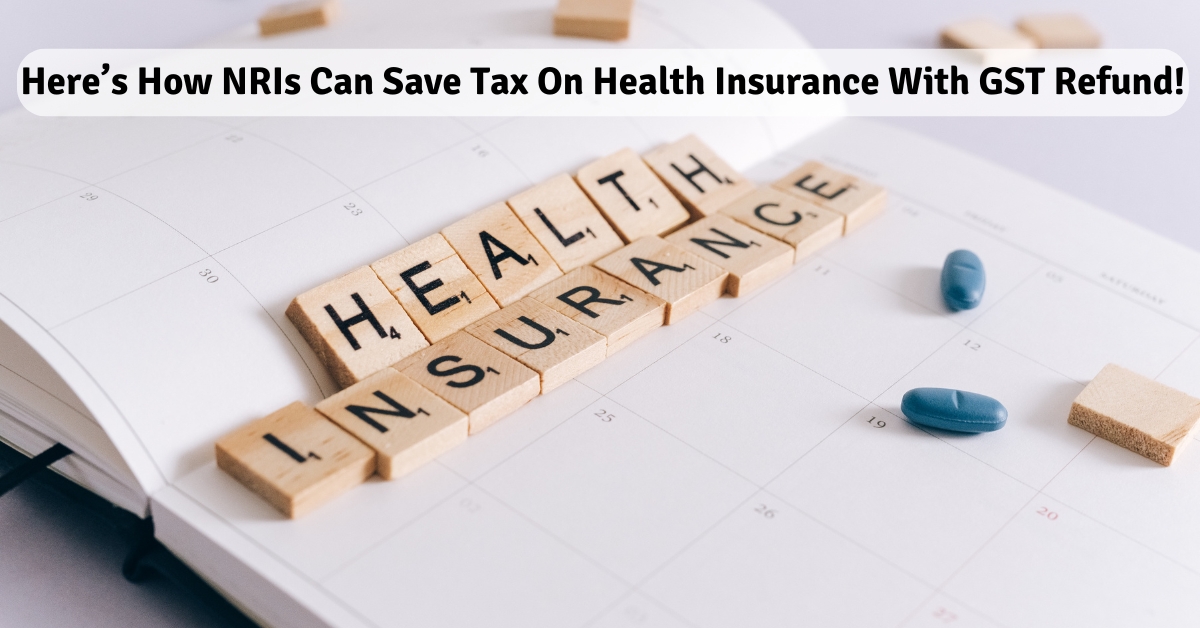Here’s How NRIs Can Save Tax on Health Insurance With GST Refund!
If you’re a Non-Resident Indian (NRI) considering health insurance in India, there’s an added incentive you might not be aware of: the possibility of saving on taxes through a Goods and Services Tax (GST) refund. Health insurance is a vital component of a well-rounded financial plan, particularly for NRIs who want to secure healthcare for themselves or their families in India. Early investment in a suitable health insurance plan is wise, as it mitigates the risk and cost associated with pre-existing medical conditions that can surface with age.
The Indian taxation framework offers an appealing advantage for NRIs: you can claim a GST refund on the health insurance premiums paid in India. This is especially beneficial since you’re likely paying taxes in your current country of residence. Eligibility for a GST refund hinges on certain criteria set by your insurance provider, and it’s crucial to opt for this refund actively during the purchase or renewal of your policy.
Understanding Health Insurance for NRIs
Health insurance in India offers comprehensive coverage, including hospitalization expenses, day-care procedures, and sometimes even domiciliary treatment. As an NRI, purchasing health insurance in India can be particularly beneficial due to the relatively lower costs and extensive network of hospitals.
The Financial Advantage: GST Refund
The Indian taxation system allows NRIs to claim a GST refund on health insurance premiums, acknowledging the dual tax burden faced due to their global income. This refund mechanism is designed to provide financial relief and encourage NRIs to invest in health insurance policies in India.
Eligibility for GST Refund
To be eligible for a GST refund on your health insurance, the policy must be initiated by an NRI. While the proposer needs to be an NRI, insurance companies might have varying eligibility criteria for the insured individuals under the policy.
The premium for the health insurance must be paid annually, and from a Non-Resident External (NRE) Account, ensuring the funds originate from outside India.
Navigating the GST Refund Process
The process for claiming a GST refund on health insurance involves several steps:
- Eligibility Verification: Confirm your eligibility for a GST refund with your insurance provider. Ensure you meet the residency and payment criteria as stipulated by the regulations.
- Policy Payment: Pay the premium through your NRE account to ensure the transaction qualifies for a GST refund. This account reflects your non-resident status and facilitates the refund process.
- Claiming the Refund: When purchasing or renewing your policy, opt for the GST refund feature. This is not an automatic process and requires explicit selection.
- Documentation: Be prepared with all necessary documents, including a Tax Residency Certificate, proof of foreign address, and a detailed bank statement from your NRE account showing the premium payment.
Key Considerations for GST Refund
To successfully claim a GST refund, NRIs should note the following:
- The NRI proposer should be listed as an insured member on the policy.
- GST refunds are applicable only for policies with annual payment terms.
- Premiums must be paid through an NRE account.
- To qualify, NRIs need to have resided outside India for a minimum of 180 days.
- A GST refund claim is not automatic; it must be selected when purchasing or renewing the health insurance.
- GST refunds can also be claimed for health insurance policies for parents residing in India, where the NRI is the proposer.
- Ensure all necessary documents are ready before applying for the GST refund.
Required Documentation
To apply for a GST refund, the following documents are usually needed:
- Tax Residency Certificate (TRC) for NRIs.
- Proof of address in the foreign country.
- Declaration and KYC documents like a passport and Aadhaar card.
- Bank statements from the NRE account used for premium payments over the last six months.
The GST refund process entails document verification and policy issuance, typically within a 15-day period post-issuance of the policy.
Why Act Now
A growing number of NRIs are considering returning to India for various personal and professional reasons, particularly in retirement. As age increases, so does the likelihood of health issues, which can make securing affordable health insurance more challenging. Purchasing a policy sooner rather than later ensures you are adequately covered when you need it most.
In essence, while the NRI status is a consistent requirement for GST refund eligibility on health insurance premiums, the specific conditions and required documentation can differ among insurers. It’s crucial to understand these aspects to maximize the benefits of your health insurance and secure a GST refund. Always consult directly with your insurance provider to ensure compliance with their specific requirements and to make the most of your financial planning.
Conclusion
For NRIs, understanding and utilizing the GST refund option for health insurance premiums in India is a key financial strategy. It not only offers tax savings but also ensures that you and your family have access to quality healthcare services in India. Early and informed decisions in choosing the right health insurance plan can provide peace of mind and substantial financial benefits, making it a wise investment in your overall well-being and financial health.
By staying informed about the eligibility criteria, payment methods, and documentation required for a GST refund, you can effectively manage your health insurance investments in India and maximize your savings.




